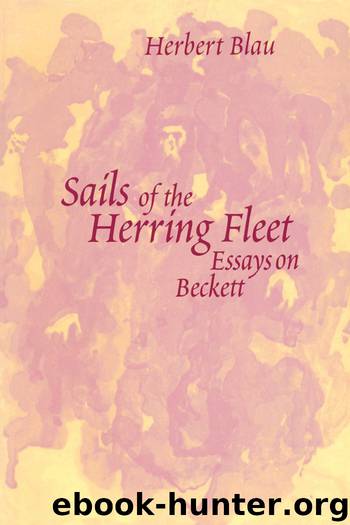Sails of the Herring Fleet by Blau Herbert;

Author:Blau, Herbert;
Language: eng
Format: epub
Publisher: University of Michigan Press
FIG. 10. The lover’s discourse in Beckett is a broken monologue of one who if he couldn’t love well loved only too much, and still loves, first love, always, always in vain. . . . (Robert Symonds in Krapp’s Last Tape, directed by Jules Irving at The Actor’s Workshop of San Francisco, 1960)
But what begins (again) with such delicacy becomes monstrous in love, the waters never quite meeting in the consummation of desire. Nor is it really, in Beckett, as in A Lover’s Discourse, that the waters merely recede and the other departs, turns away, fails to show, withdraws. Rather, and more oppressive yet, the other approaches. Even in recession the other approaches, “the other advances full upon me. He emerges as from heavy hangings, advances a few steps, looks at me, then backs away. He is stopping and seems to be dragging invisible burdens. . . . He raises his eyes and I feel the long imploring gaze, as if I could do something for him” (Unnamable 14). If Barthes rehearses what it is to be in love, Beckett conveys the terror of being-loved, the one who is loved gratuitously and asked to love in return without ever knowing what it is that we call love, for which one invents the obscurities that supply its rhetoric which always fails, like the very idea of love. It’s as if the approach of love incapacitates the very thing that loves. As for the mother who loves, can one learn to love like that? From innate knowledge? asks the voice of The Unnamable, “is that conceivable? Not for me” (12). The dysfunction seems to be in the knowledge of love itself, what cannot be known without love so that love itself might be known.
“But I seem to have retained certain descriptions, in spite of myself,” the Unnamable goes on: “They gave me courses on love, on intelligence,” the curriculum of the pensum, “most precious, most precious.” But what has that to do with love? “I use it still, to scratch my arse with” (13). And yet there’s a point in Beckett when the arse is sufficiently scratched to become the punctum in the pensum “once known, long neglected, finally forgotten, to perform,” before there’s an end, “gaining ground, losing ground” in the labyrinthine torment that can’t be grasped or limited or felt or suffered, “no, not ever suffered” (36)—and yet, when the very possibility of love is foreclosed, there is the “luminous none the less” (16), the pathos in the punctum which comes from the heart in the head.
Among the stars and constellations, the protagonist of First Love can only make out the Wains, first shown him by his father. He has also discovered the tenderness of the earth for those with no other prospect but her “and how many graves in her giving, for the living”—including the newborn child whose cries he plays with as he once played with song, “on, back, on, back, if that may be called playing” (35).
Download
This site does not store any files on its server. We only index and link to content provided by other sites. Please contact the content providers to delete copyright contents if any and email us, we'll remove relevant links or contents immediately.
Call Me by Your Name by André Aciman(19875)
Ready Player One by Cline Ernest(13939)
How to Be a Bawse: A Guide to Conquering Life by Lilly Singh(7143)
Wiseguy by Nicholas Pileggi(5294)
The Kite Runner by Khaled Hosseini(4937)
On Writing A Memoir of the Craft by Stephen King(4647)
Audition by Ryu Murakami(4596)
The Crown by Robert Lacey(4557)
Call me by your name by Andre Aciman(4459)
Gerald's Game by Stephen King(4355)
Harry Potter and the Cursed Child: The Journey by Harry Potter Theatrical Productions(4301)
Dialogue by Robert McKee(4145)
The Perils of Being Moderately Famous by Soha Ali Khan(4055)
Dynamic Alignment Through Imagery by Eric Franklin(3901)
Apollo 8 by Jeffrey Kluger(3497)
How to be Champion: My Autobiography by Sarah Millican(3489)
The Inner Game of Tennis by W. Timothy Gallwey(3450)
Seriously... I'm Kidding by Ellen DeGeneres(3398)
Darker by E L James(3394)
